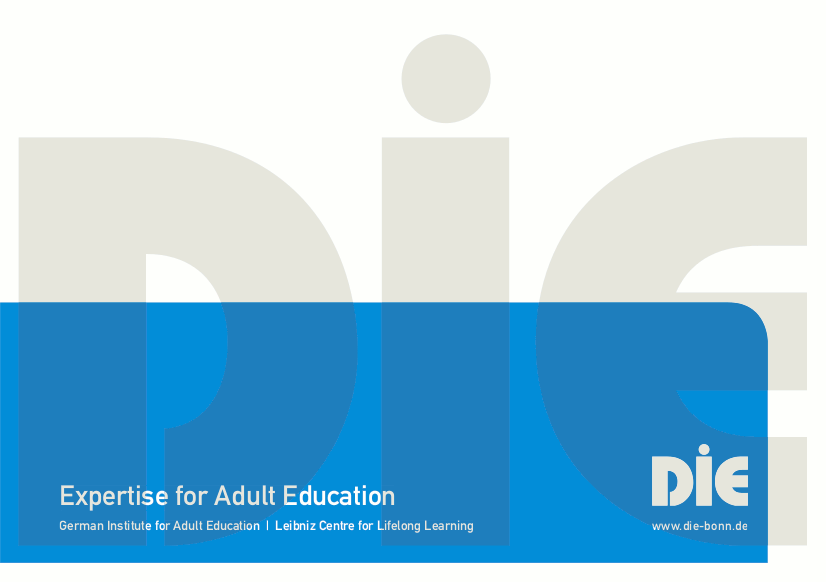About the Institute
We work to increase the quality of continuing education and to improve the education of adults.
The German Institute for Adult Education - Leibniz Centre for Lifelong Learning is a research institution of the Leibniz Association. We pursue the goal of contributing to the personal development, democratic social participation and employability of adults. Based on research results, transfer of knowledge and infrastructures for research, we work to increase the quality of continuing education and to improve the education of adults.
Socially Relevant Issues
DIE research and development covers several paramount socially relevant issues, e.g.: How can continuing education systems enhance participation and competences and reduce social disparities? How can continuing education institutions be organised and managed to be pedagogically efficient? How can continuing education programmes be tailored to meet needs and demands? How does teaching, learning and counselling work in adult and continuing education? How can our scientific services support and facilitate research activities?
DIE Tasks and Claims
The German Institute for Adult Education - Leibniz Centre for Lifelong Learning
- conducts application-relevant and fundamental research,
- provides a transfer of knowledge and infrastructure for research,
- develops innovative concepts for practitioners,
- and advises stakeholders of national and international continuing education policy.
The institute's research and its research-based services support the development of both continuing education science as well as practice and politics in the field of adult education. Hence, the DIE is equally geared to the needs of continuing education research and practice and pursues a periodical research strategy. This systematic cycle includes the identification of essential and current issues in science, politics and practice of continuing education and lifelong learning, the study of these issues and disclosure of the findings as well as the testing and implementation in the field, or provision of permanent infrastructural services.
Adult Education from a National and International Perspective
The DIE establishes contacts between stakeholders in national and international continuing education, and is hence the central, interdisciplinary active contact in this area. This is an essential task based on the multi-layered nature of German and more so international continuing education field:
- Research on continuing education is conducted in various disciplines,
- German educational policy is marked by federalism and the cultural autonomy of the Federal states,
- varying constellations of interest need to be aligned internationally and applied to the desiderata of research and practice,
- a multitude of different providers offer continuing education programmes.
The DIE represents German continuing education on an international level: DIE research associates are members of international boards, coordinate or participate in transnational projects. Our scientists' publications attract both national and international interest.
DIE Structure
The institute's focus is negotiated annually with the national funding bodies. The Administrative Board supervises processes within the DIE. The Advisory Board supervises contents. A registered association (e. V.) with currently 20 members from practice and research of continuing education forms the legal entity. The DIE has cooperative agreements with several universities.
Sectors
DIE services are provided in two sectors: Research Sector and Infrastructure Sector. The Research Sector provides application-oriented and fundamental research and development. It is divided into four departments: System and Policies, Organisation and Programme Planning, as well as Teaching and Learning.
The Infrastructure Sector develops products and services in two departements: Knowledge Transfer and Research Infrastructure. They have been the foundation in the field for decades and are characteristic for the DIE, e.g. survey and evaluation of Continuing Education Statistics, the library, DIE publications, ProfilPASS or the portal wb-web.
In alliance with the image of a Leibniz Centre, these services are closely connected to research, i.e. by being based on the institute's or other stakeholders' research findings or by enabling or supporting research. In accordance with the strategic objective of uniting research, development and infrastructural services, both sectors work together closely.
Mission Statement
Please click here for our mission statement
Image Brochure
Our image brochure provides you with information about the DIE.

Photo: Marco Rothbrust
Kurzlink zu dieser Seite:
die-bonn.de/li/1251


